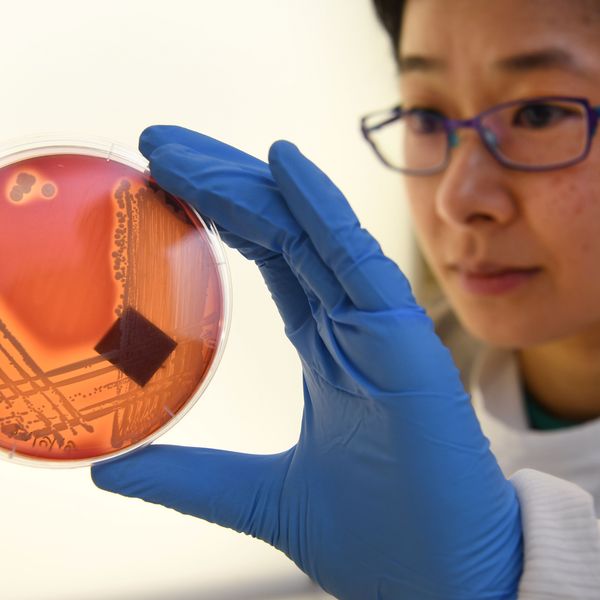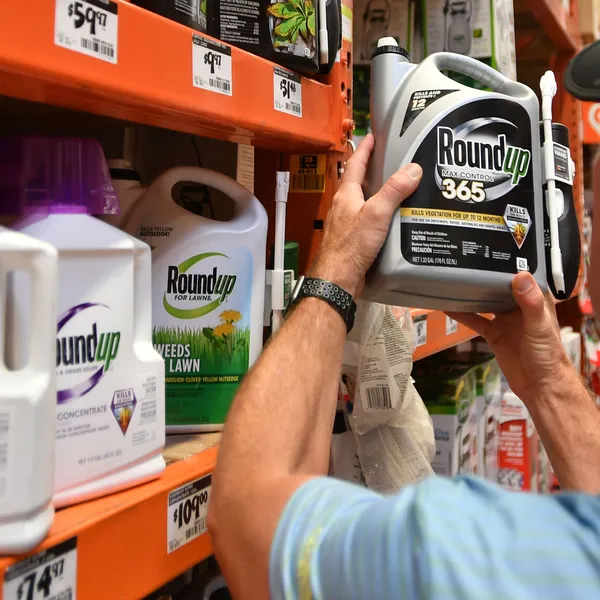Demanding Ban on Deadly Pesticides, Advocates Drop Millions of Dead Bees on EPA Doorstep
'What's happening today to pollinators is no different than what happened 50 years ago with the collapse of the bald eagle due to the use of DDT'
Advocating for a ban on toxic pesticides that have led to massive bee die-offs nationwide, a truck filled with millions of dead pollinators trundled across the country on Wednesday afternoon to reach its final destination: the front steps of the Environmental Protection Agency (EPA) headquarters in Washington, D.C.
"If we stop keeping bees, who's going to pollinate your fruits and vegetables? This can't go on."
--Roger Williams,
Central Maryland Beekeepers Association
The truck's arrival at EPA headquarters heralds a rally in which environmental groups, beekeepers, organic food advocates and others will "deliver over 4 million signatures urging an immediate ban on bee-killing pesticides" to the agency, writes the conservation group Friends of the Earth.
"Bees pollinate most of the world's most common crops, including summer favorites like peaches and watermelon," said Environment America in a press statement. "But over 40 percent of U.S. honeybee hives die each year, costing the farming and beekeeping industry more than $2 billion annually."
As Scott Nash, CEO of Mom's Organic, said in a statement, "What's happening today to pollinators is no different than what happened 50 years ago with the collapse of the osprey, bald eagle, and other bird and aquatic animal populations due to the use of DDT. If we allow the chemical agribusiness industry to continue these short-sighted practices, food costs will increase as food supplies diminish."
"In the five years since I started keeping bees, I've seen many hives killed by pesticides," added James Cook, a Minnesota-based beekeeper who has been driving the truck across the country since last Monday. "If some fundamental things don't change, it's going to be really hard for beekeepers to adapt to the environment around us."
As the crisis continues, studies show that the so-called neonicotinoid class of pesticides, or neonics, are a major contributing factor to bee population decline, as Common Dreams has reported. (Pesticide giants have lobbied heavily against any regulations of their multi-billion dollar industry.)
And despite "a process to assess four types of neonics and their impacts on pollinators" the EPA launched a year ago, and an agency study that in January confirmed the link between one variety of neonics and widespread bee deaths, further agency assessments of what critics describe as bee-toxic pesticides--and in turn, action--are still outstanding.
Yet the bees and their keepers don't have time to lose.
"We have so many losses it's worse than break-even. It is getting harder and harder to keep bees and make a living," said Roger Williams, president of the Central Maryland Beekeepers Association. "And if we stop keeping bees, who's going to pollinate your fruits and vegetables? This can't go on."
Rally participants documented the event on Twitter under the hashtag #keepthehivesalive:
An Urgent Message From Our Co-Founder
Dear Common Dreams reader, The U.S. is on a fast track to authoritarianism like nothing I've ever seen. Meanwhile, corporate news outlets are utterly capitulating to Trump, twisting their coverage to avoid drawing his ire while lining up to stuff cash in his pockets. That's why I believe that Common Dreams is doing the best and most consequential reporting that we've ever done. Our small but mighty team is a progressive reporting powerhouse, covering the news every day that the corporate media never will. Our mission has always been simple: To inform. To inspire. And to ignite change for the common good. Now here's the key piece that I want all our readers to understand: None of this would be possible without your financial support. That's not just some fundraising cliche. It's the absolute and literal truth. We don't accept corporate advertising and never will. We don't have a paywall because we don't think people should be blocked from critical news based on their ability to pay. Everything we do is funded by the donations of readers like you. Will you donate now to help power the nonprofit, independent reporting of Common Dreams? Thank you for being a vital member of our community. Together, we can keep independent journalism alive when it’s needed most. - Craig Brown, Co-founder |
Advocating for a ban on toxic pesticides that have led to massive bee die-offs nationwide, a truck filled with millions of dead pollinators trundled across the country on Wednesday afternoon to reach its final destination: the front steps of the Environmental Protection Agency (EPA) headquarters in Washington, D.C.
"If we stop keeping bees, who's going to pollinate your fruits and vegetables? This can't go on."
--Roger Williams,
Central Maryland Beekeepers Association
The truck's arrival at EPA headquarters heralds a rally in which environmental groups, beekeepers, organic food advocates and others will "deliver over 4 million signatures urging an immediate ban on bee-killing pesticides" to the agency, writes the conservation group Friends of the Earth.
"Bees pollinate most of the world's most common crops, including summer favorites like peaches and watermelon," said Environment America in a press statement. "But over 40 percent of U.S. honeybee hives die each year, costing the farming and beekeeping industry more than $2 billion annually."
As Scott Nash, CEO of Mom's Organic, said in a statement, "What's happening today to pollinators is no different than what happened 50 years ago with the collapse of the osprey, bald eagle, and other bird and aquatic animal populations due to the use of DDT. If we allow the chemical agribusiness industry to continue these short-sighted practices, food costs will increase as food supplies diminish."
"In the five years since I started keeping bees, I've seen many hives killed by pesticides," added James Cook, a Minnesota-based beekeeper who has been driving the truck across the country since last Monday. "If some fundamental things don't change, it's going to be really hard for beekeepers to adapt to the environment around us."
As the crisis continues, studies show that the so-called neonicotinoid class of pesticides, or neonics, are a major contributing factor to bee population decline, as Common Dreams has reported. (Pesticide giants have lobbied heavily against any regulations of their multi-billion dollar industry.)
And despite "a process to assess four types of neonics and their impacts on pollinators" the EPA launched a year ago, and an agency study that in January confirmed the link between one variety of neonics and widespread bee deaths, further agency assessments of what critics describe as bee-toxic pesticides--and in turn, action--are still outstanding.
Yet the bees and their keepers don't have time to lose.
"We have so many losses it's worse than break-even. It is getting harder and harder to keep bees and make a living," said Roger Williams, president of the Central Maryland Beekeepers Association. "And if we stop keeping bees, who's going to pollinate your fruits and vegetables? This can't go on."
Rally participants documented the event on Twitter under the hashtag #keepthehivesalive:
Advocating for a ban on toxic pesticides that have led to massive bee die-offs nationwide, a truck filled with millions of dead pollinators trundled across the country on Wednesday afternoon to reach its final destination: the front steps of the Environmental Protection Agency (EPA) headquarters in Washington, D.C.
"If we stop keeping bees, who's going to pollinate your fruits and vegetables? This can't go on."
--Roger Williams,
Central Maryland Beekeepers Association
The truck's arrival at EPA headquarters heralds a rally in which environmental groups, beekeepers, organic food advocates and others will "deliver over 4 million signatures urging an immediate ban on bee-killing pesticides" to the agency, writes the conservation group Friends of the Earth.
"Bees pollinate most of the world's most common crops, including summer favorites like peaches and watermelon," said Environment America in a press statement. "But over 40 percent of U.S. honeybee hives die each year, costing the farming and beekeeping industry more than $2 billion annually."
As Scott Nash, CEO of Mom's Organic, said in a statement, "What's happening today to pollinators is no different than what happened 50 years ago with the collapse of the osprey, bald eagle, and other bird and aquatic animal populations due to the use of DDT. If we allow the chemical agribusiness industry to continue these short-sighted practices, food costs will increase as food supplies diminish."
"In the five years since I started keeping bees, I've seen many hives killed by pesticides," added James Cook, a Minnesota-based beekeeper who has been driving the truck across the country since last Monday. "If some fundamental things don't change, it's going to be really hard for beekeepers to adapt to the environment around us."
As the crisis continues, studies show that the so-called neonicotinoid class of pesticides, or neonics, are a major contributing factor to bee population decline, as Common Dreams has reported. (Pesticide giants have lobbied heavily against any regulations of their multi-billion dollar industry.)
And despite "a process to assess four types of neonics and their impacts on pollinators" the EPA launched a year ago, and an agency study that in January confirmed the link between one variety of neonics and widespread bee deaths, further agency assessments of what critics describe as bee-toxic pesticides--and in turn, action--are still outstanding.
Yet the bees and their keepers don't have time to lose.
"We have so many losses it's worse than break-even. It is getting harder and harder to keep bees and make a living," said Roger Williams, president of the Central Maryland Beekeepers Association. "And if we stop keeping bees, who's going to pollinate your fruits and vegetables? This can't go on."
Rally participants documented the event on Twitter under the hashtag #keepthehivesalive:

